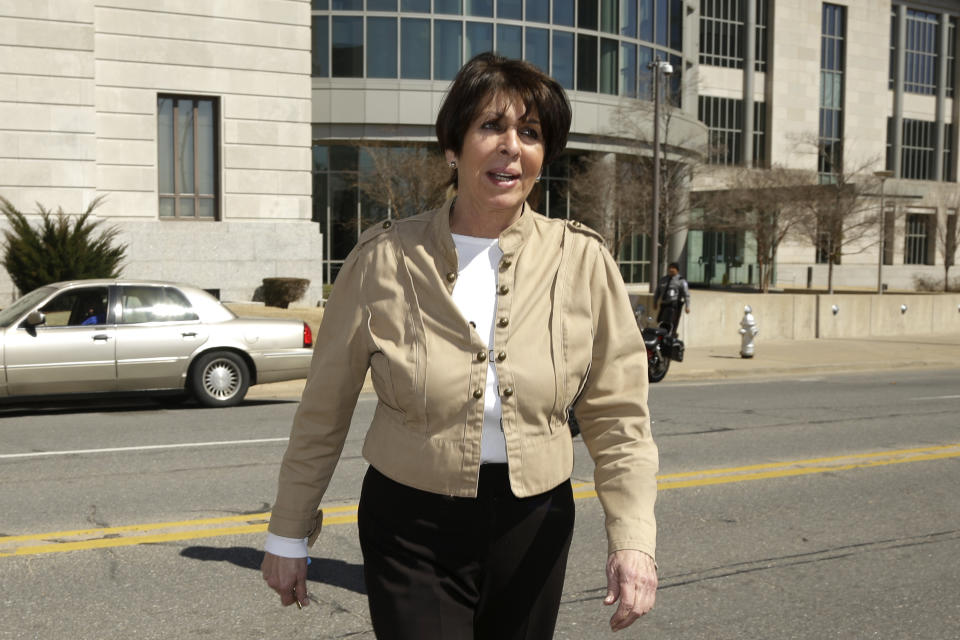Federal jury convicts former Arkansas treasurer
LITTLE ROCK, Ark. (AP) — A jury convicted former Arkansas Treasurer Martha Shoffner of federal bribery and extortion charges Tuesday, saying her acceptance of $36,000 from a bond trader who did business with the state was a felony rather than just a lapse in ethical judgment.
Shoffner wept quietly at the defense table before the jurors, who deliberated for about three hours, returned to the courtroom. But the former Democratic official regained her composure and showed no reaction as U.S. District Judge J. Leon Holmes read the 14 consecutive guilty verdicts.
Holmes still must rule on a motion to acquit that was filed by defense lawyers, who argued that the government didn't prove key elements of its case, including that the payments affected interstate commerce and that the bonds involved federal funds. Holmes had delayed ruling on the motions, saying he would only do so if a guilty verdict was returned and after the sides filed written briefs arguing their positions.
Shoffner was arrested in May when FBI agents raided her home in Newport, finding $6,000 that was delivered in a pie box by bond dealer Steele Stephens after he began cooperating with authorities. That cash had been supplied by the FBI, though Stephens testified that he'd made a series of $6,000 payments with his own money, totaling $36,000 that he gave in exchange for getting more state bond business.
Prosecutors showed that Stephens had twice as much state bond business as any of the other 10 or so dealers approved to do business with the treasurer's office.
Assistant U.S. Attorney Stephanie Mazzanti told jurors in her closing arguments that the case before them was simple: Shoffner accepted money from the broker and let him control a larger share of the state's bond portfolio.
"She's guilty. She did this. She's guilty," Mazzanti said.
The defense opted not to call witnesses Tuesday, instead moving straight into closing arguments.
Stephens, 52, was granted immunity by prosecutors, which enabled him to escape any federal charges and keep the $2.5 million in commissions he picked up while doing business with Shoffner's office.
Prosecutors kept Stephens on the witness stand for nearly a day and a half, which included playing a two-hour audio recording of Shoffner and him conversing while he wore a listening device in January 2013. The jury also watched a one-hour video recording from the day of Shoffner's arrest. Stephens wore a hidden video camera for that exchange.
In one of the recorded conversation between Shoffner and Stephens, Shoffner says, "I feel like I'm a (expletive) criminal."
Mazzanti told the panel Tuesday: "There's a reason she felt that way," adding Shoffner had "betrayed the trust of the people of Arkansas."
Stephens testified that he and Shoffner first discussed a financial arrangement because she didn't have the money to maintain her home in Newport and a Little Rock residence.
Under questioning from prosecutors, Stephens acknowledged he felt the payments would generate more bond business for him but he also said he looked at the payments as giving money to help a friend.
Defense attorney Chuck Banks worked to convince jurors that Shoffner should not have been charged federally but instead should have faced state ethics charges for not reporting the cash gifts.
Shoffner also faces 10 counts of mail fraud after prosecutors accused her of misspending campaign funds on personal items. Those charges were set for trial March 31, but Holmes said he would reset that trial. The judge also put off a pre-sentence investigation until the separate campaign money counts are decided.
Chief Assistant U.S. Attorney Patrick Harris called Tuesday's verdict sad but dismissed the defense's notion that it was only an ethics violation.
"It's an ethics problem and a criminal problem," Harris said. "She took the money."


